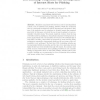Free Online Productivity Tools
i2Speak
i2Symbol
i2OCR
iTex2Img
iWeb2Print
iWeb2Shot
i2Type
iPdf2Split
iPdf2Merge
i2Bopomofo
i2Arabic
i2Style
i2Image
i2PDF
iLatex2Rtf
Sci2ools
FC
2009
Springer
2009
Springer
Evil Searching: Compromise and Recompromise of Internet Hosts for Phishing
Attackers compromise web servers in order to host fraudulent content, such as malware and phishing websites. While the techniques used to compromise websites are widely discussed and categorized, analysis of the methods used by attackers to identify targets has remained anecdotal. In this paper, we study the use of search engines to locate potentially vulnerable hosts. We present empirical evidence from the logs of websites used for phishing to demonstrate attackers’ widespread use of search terms which seek out susceptible web servers. We establish that at least 18% of website compromises are triggered by these searches. Many websites are repeatedly compromised whenever the root cause of the vulnerability is not addressed. We find that 19% of phishing websites are recompromised within six months, and the rate of recompromise is much higher if they have been identified through web search. By contrast, other public sources of information about phishing websites are not currently rai...
Cryptography | FC 2009 | Phishing | Web Servers | Websites |
| Added | 26 May 2010 |
| Updated | 26 May 2010 |
| Type | Conference |
| Year | 2009 |
| Where | FC |
| Authors | Tyler Moore, Richard Clayton |
Comments (0)

